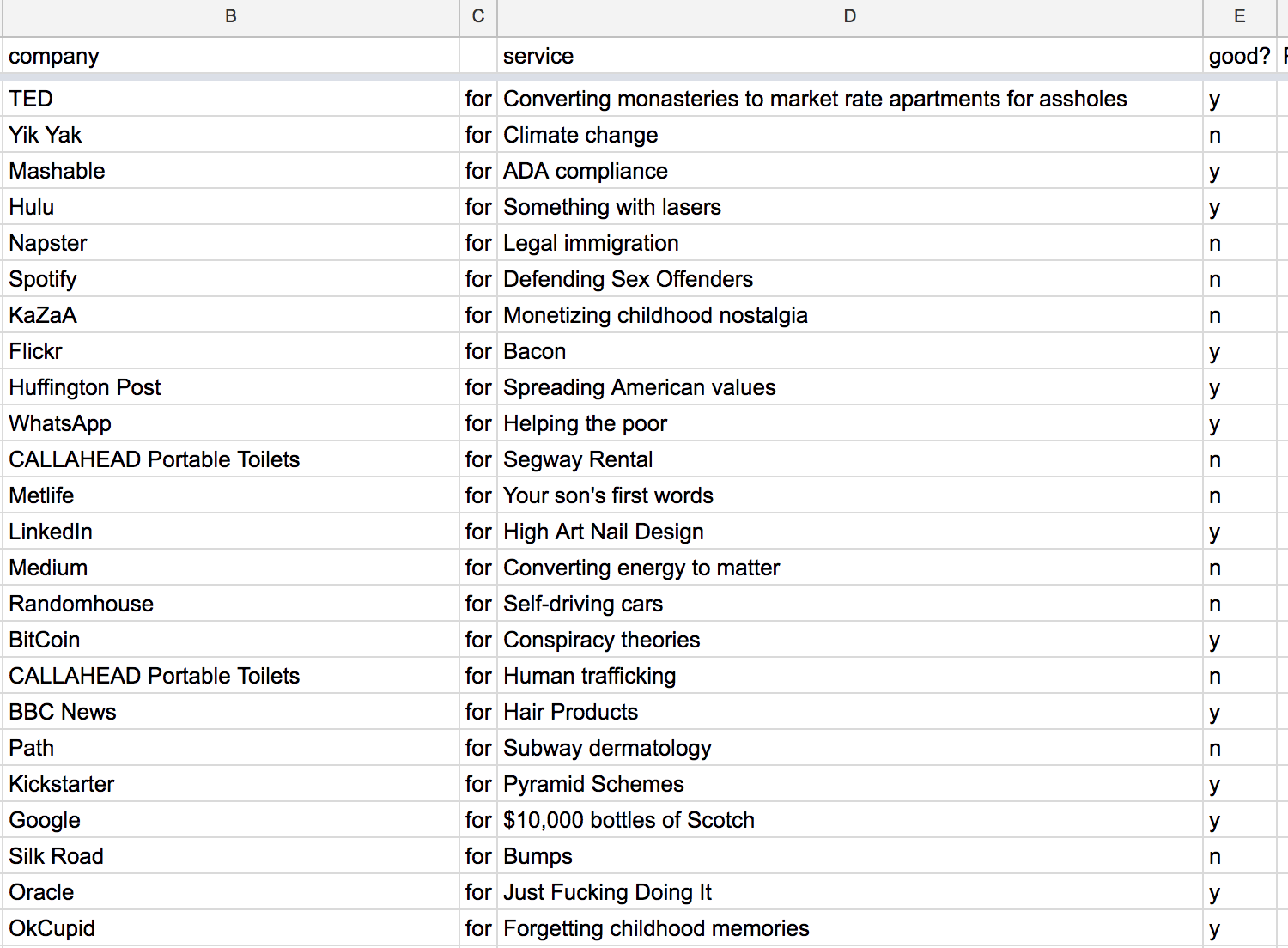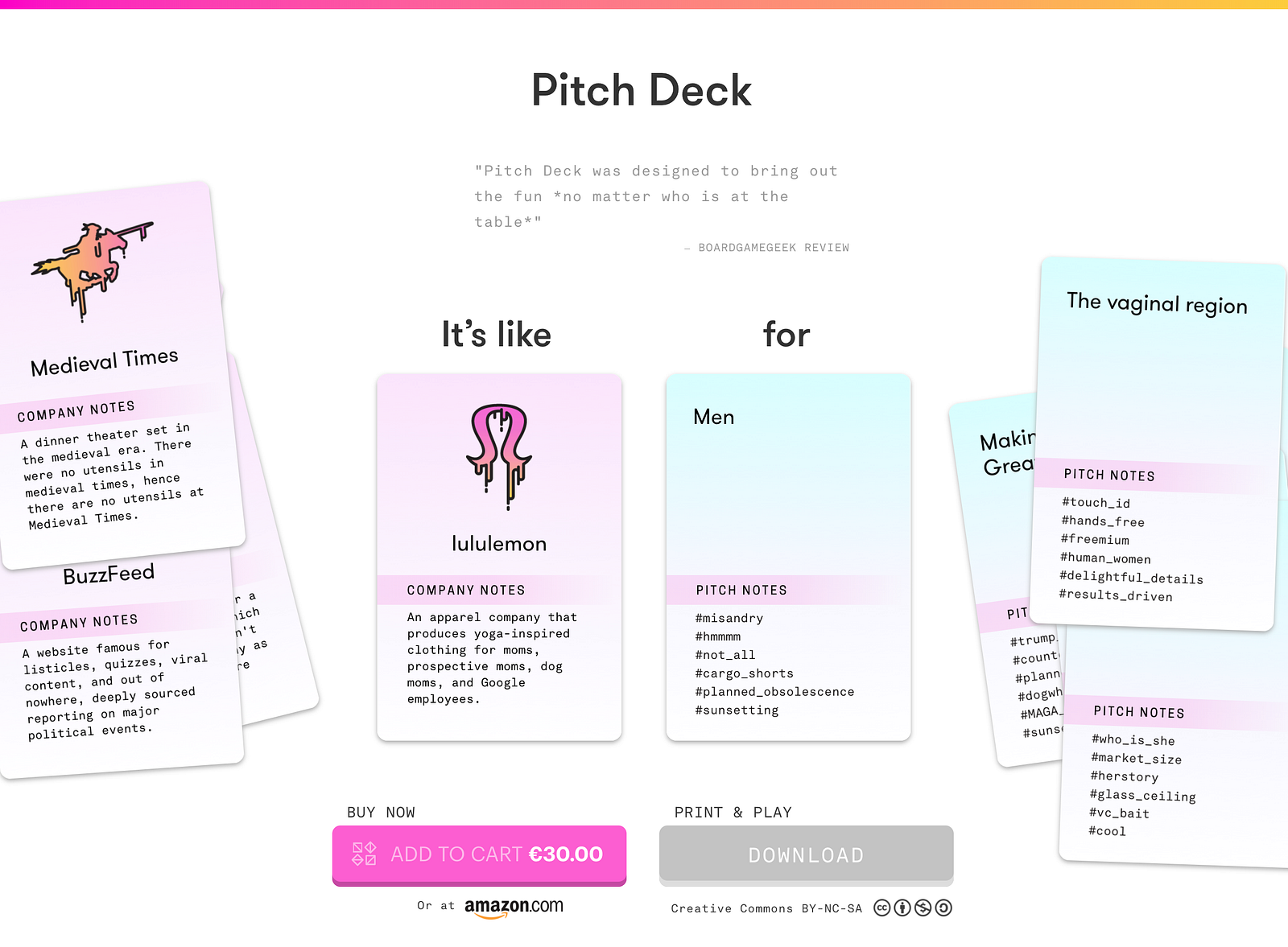When Alex Hague and I first prototyped our satirical party game Pitch Deckwe threw together a spreadsheet of company names next to a list of what we would eventually call “pitch cards” — markets or demographics or just goofy ideas we could pair with the company cards.
Next I made another tab that randomly paired companies with another set of random pitch ideas to see whether the pairings were funny or not:

Not all of them worked, per se, but enough did that we knew were on to something. (How we decided which companies and ideas made the final cut of the game is a whooooooole separate post that we’ll get to one day; the tl;dr basically being “companies like Facebook and Google are too general to make fun of, and extremely broad or extremely specific demographic-based pitch cards work best.”)
Two years later, Pitch Deck has now shipped to all of our 1,889 Kickstarter backers and is doing well on Amazon with all 5-star reviews. We even just got our first friendly local game store spotlight video from Bell of Lost Souls.
Taking the website thing too far

As we were getting the game available for retail sales, we were also preparing to launch our website pitchdeck.business and I wondered what it’d be like to build a page for every card combination possible. In the retail version of the game that’s something like 31,500 pairs. A big number, but not so big you couldn’t brute force it.
Around that time my buddy and Y Combinator partner Gustaf Alströmer asked me what our SEO strategy was. I replied “None really, it’s a card game, hopefully people play it with their friends and have fun and we get some good word of mouth out of it”.
Part of what makes creating a card game fun is that they have an inherently viral nature (also known as the K-factor) to how people hear about them. Because games must be played with multiple people, each copy represents a possible set of fans. If the game is fun enough, some of those new players will buy a copy. It’s a virtuous cycle that plays out entirely IRL.
And indeed, we frequently hear from fans of Pitch Deck that they bought their copies on their phone while in the midst of playing the game with their friends. Think of it as a kind of lightweight network effect: each additional copy of the game doesn’t increase the overall value of a single copy, but rather the probability that more friends will buy the game.
But Gustaf’s question made me wonder whether this approach of a page-for-every-pair might be a subversive but canny SEO strategy — if every card pairing had a URL indexed by Google, then anytime someone looked up AirBnB for Fish we’d have a chance of showing up in the results.
And if someone was irreverent enough to google an idea for a company that just happened to be in our game, well, then, they might also be interested in buying a copy. At the minimum, if you’re googling Arby’s for Nonsexual glory holesthere’s a pretty good chance you’ll enjoy playing Pitch Deck.
I also realized that if we enabled some basic analytics and Google’s Search Console we could get a peek into what cards people were most interested in. The most popular URLs would reflect a kind of id-of-the-web as seen through the lens of our card game. And Google’s Search Console could give us insight into the keywords users were typing in order to get to our site.
Sometimes when you’re trying to build something simple but can’t resist going overboard, it is called “boiling the ocean”. This is basically what this idea amounted to (I mean who really needs a Ruby on Rails app for a card game?!) but I couldn’t resist once I got the idea in my head.
It lives
A couple weeks later, I had built the site as a basic Rails application and seeded it with the entire game. Each company card has its own page, as do all 31,500 combinations of pairings and each pitch card, and every hashtag.

The whole site has been now indexed by the Google search robot, and after about a month of modest traffic, we’ve collected just enough data to draw out some interesting trends.
But before I get any farther, a spoiler and content warning: it turns out the most popular Pitch Deck pairings on the web are the sex ones. They always are.
This is the case for Cards Against Humanity’s Lab as well: Max Temkin told me that the cards that do the best in their Lab are always the naughty ones. This is a funny bias in games like ours since it doesn’t play out in person; the likely explanation being that people are more inclined to choose raunchy card pairings when they’re sitting alone in front of a computer, but when they’re tasked with playing amongst friends, they tone it down.
And it turns out people find the CAH site with similarly goofy search terms — darth vader dolphin pterodactyl surprise was the least offensive one from the list Max sent me.
Free unicorn company ideas
The Pitch Deck data could be interpreted as a goofy way to judge demand for an out-there company idea. If a lot of people are searching for the same idea, it clearly means there’s some kind of interest in it.
The most feasible one I’ve seen so far that has lead folks to our site? Netflix for VR Porn. We were briefly the #3 result for this search, but the page seems have dropped significantly in the midst of a lot of hype-y news articles about the topic. And probably because we’re not offering a VR Porn rental site. But hey, it seems like a …fertile market to go after.
Another top search leading people to Pitch Deck? 3d printed fleshlight. Our page for “Fleshlight for 3D Printed Sex Toys” is now ranked #4 for that search. And while this might not be the most profitable business idea (in fact, it’s probably a terrible idea — the exact reason people are googling this is because they don’t want to pay for a real Fleshlight), it gives a peek into the future of what people really want to do with their 3D printer, and that is to manufacture genitals out of ABS plastic.
Unfortunately, this idea also highlights some of the darker terms people are regularly typing into Google. Most disturbingly: variations on Pornhub for kids. Now I assume this is not Pornhub for kids per se, but rather Pornhub ofkids. Discovering this was a really upsetting reminder of the kinds of things people are still looking for on the web. I’ve since de-indexed that and a handful of other pages (e.g. “PornHub for child prisons”) from Google so hopefully we’ll stop showing up in those results. Shudder.
I’m keeping Farmersonly for VR porn.
My other favorite dataset is the list of pages that people happen to stumble upon. Here are the top ones via our Google Search Console:

I’m particularly fond of PornHub for imposter syndrome, where we currently occupy the #1, #2, and #3 spot on Google. I have no idea if that’s a fetish or what, but consider me interested.
People searching for Did Hitler kill Tesla seem to be ending up on “Tesla for Going back in time to kill Hitler.”
At least one person clicked on our page for soylent farts, which turns out to be a fairly well understood problem. Three people searched for donald trump snuggie and one of them clicked. Martha Stewart is also strangely popular in this data and shows up in a variety of searches: egg salad martha stewart, martha stewart illuminati, martha stewart racist, and martha stewart college all make appearances.
One final twist we weren’t expecting: people are frequently searching for the actual pitch decks (e.g., PowerPoint presentations) of companies like Kickstarter, etc.
So far Yelp is leading in that department with two clicks and a couple of dozen impressions, but also popular are venmo pitch deck, rent the runway pitch deck, and snapchat pitch deck.
It’s worth mentioning a data interpretation caveat: since the content that makes up Pitch Deck isn’t representative of all content (it’s a satirical card game based on our sense of humor relative to a particular topic), it’s impossible to really draw any meaningful conclusions about what any of this means. It’s just kind of a fun, weird, and slightly depressing peek into what people are searching for on Google.
But if you’ve read this far, you’re probably wondering whether any of this traffic has lead to sales of the game. The answer is, unfortunately, we don’t really know.
We know roughly how many people head to Amazon via our website from which pages, but we don’t actually know much after that. Amazon is a true black box when it comes to understanding the data that leads people to your listing. There’s a little more work I might do to get to the bottom of it, but the truth is, I enjoy this data much more as a side effect than anything intended to drive lots of sales.
Finally, if you’re interested in this kind of search trend analysis, check out Seth Stephens-Davidowitz. He’s written done some great work using Google Search trends to analyze people’s angst, how people search for sex, and how racist we actually are.





























